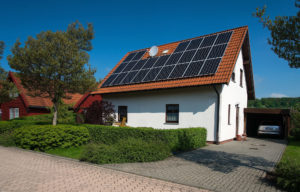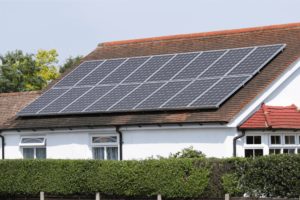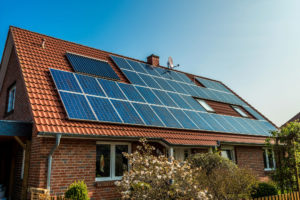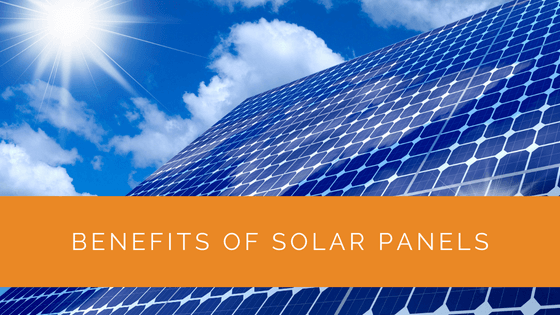Solar panels, the modern marvels harnessing the sun’s power, have gained popularity for their remarkable advantages. In this article, we’ll delve into the numerous benefits of solar panels, shedding light on why they have become a preferred choice for sustainable energy generation. Solar panels offer a compelling solution to the world’s growing energy needs, from their renewable nature and potential for cost savings to low maintenance requirements and technological advancements.
Contents
- 1 Key Takeaways
- 2 Benefits of Solar Panels
- 3 Let’s Talk about Some Cons, Too
- 4 What are Solar Panels, and How Do They Function?
- 5 Case Study: Realising Energy Savings with Solar Panels
- 6 Expert Insights From Our Solar Panel Installers About the Benefits of Solar Panels
- 7 Discover the Power of Solar with Solar Panels Network
- 8 Conclusion
Key Takeaways
- Solar panels provide a renewable energy source that can be harnessed worldwide, reducing the reliance on non-renewable resources and minimizing environmental risks.
- Solar panels can lower electricity bills, especially for businesses, and may even allow users to earn payments by supplying surplus energy to the grid.
- Solar panels are low-maintenance, technologically advanced, and have many applications, making them a versatile and sustainable energy solution.
Benefits of Solar Panels
Now that we’ve discussed the what, why, and the types, let’s dive into the many advantages of solar panels –
Renewable Energy Source
No matter which part of the world you reside in, solar energy can be easily harnessed. It is even better if you stay in heavy-sunlight zones! Being a truly renewable energy source, its supply is endless and can be found anytime, anywhere.
Unlike fossil fuels that are non-renewable and release toxic wastes during the energy extraction process, a solar panel system brings no such dangers.
Here’s a fun stat: Scientists believe it will be at least five billion years before the sun runs out of energy. So, it’s safe to assume you can enjoy solar-generated electricity as long as you’re alive!

Lower Electricity Bills
Your energy bills will be reduced depending on whether you use the solar panel system to generate some or most of the electricity needed for your power needs.
This is especially true of businesses using commercial solar panels. Massive energy needs can be met by installing a large solar energy system. This will cover most of the previous energy costs.
This is an incredible benefit, but there’s more – you may also receive payments depending upon the amounts of surplus energy that you send back to the main power grid. Generating more electricity than you can use will have the excess transmitted back to the grid via the Smart Export Guarantee (SEG). However, ensure your solar panel is connected to a grid.
Low-Maintenance Needs
Another advantage of solar panels is that they are easy to maintain. All you need to do is keep them clean, which can be done just a few times a year.
If you find it challenging to do the task yourself, you can always have panel cleaning companies do the job at relatively affordable costs. The main reason why solar panels are low-maintenance is that they have no moving parts.
Besides the rare wear-and-tear, you might need to change the inverter. But this must be done only once every five to 10 years if your solar panel manufacturer is reliable and top-notch. So, compared to the initial cost of a solar panel, the return on investment is good.
Technological Advancements
Another of the many benefits of solar panels is that their function is not stagnant. Technology in this area is continuously evolving, especially with nanotechnology and quantum physics enhancements.
As these technologies improve in the coming years, not only will solar panels generate more electrical input with the same amount of solar energy, but battery storage capabilities will also improve. What we see now is just the beginning!

Myriad of Applications
Finally, solar panels find diverse applications both in terms of electricity generation as well as heat production (solar thermal). Solar panels find broad uses, from powering satellites in space to distilling water for regions with a restricted water supply and providing electricity access to areas with none.
Plus, as solar energy systems’ technology advances, panels can be transparent to preserve the building’s aesthetics and even be integrated into building materials.
Let’s Talk about Some Cons, Too
With so many pros to its credit, you must wonder if a solar panel has any disadvantages. The answer is yes, and they are discussed below –
Weather-Reliant
Among the cons of solar panels, the one that must be mentioned first is that these systems depend heavily on the place’s weather conditions. Though solar panels can convert energy to electricity even on rainy or cloudy days, their efficiency will naturally fall.
Then, it would be best to consider that the panels’ efficiency will further reduce during the winter season. Finally, solar panels cannot be used at night. So, even a few cloudy or rainy days can significantly impact energy levels.
Expensive
Though solar panels are low-maintenance, they are not easy to procure. Given their high initial costs, many average households may find it challenging to purchase solar panels. This is because the system doesn’t just include panels and frames but also the cost of wiring, inverter, solar batteries, and installation charges.
However, as solar technologies improve, initial costs are expected to reduce.
Not Always Space-Efficient
Modest residential roofs can only accommodate so many solar panels before they run out of space. If your electricity needs are high, you must install more solar panels to collect larger amounts of sunlight.
Thankfully, there’s still an alternative – have some of the panels installed in your yard. If you don’t have one or it’s too small, you can still install some panels on the roof to meet some energy requirements.

What are Solar Panels, and How Do They Function?
Also known as solar modules or solar PV panels, solar panels are devices consisting of panels and frames which convert the energy from the sun (solar energy) into electricity. The electricity produced can be used for residential and commercial applications.
Some of the top uses of the electricity generated by a solar panel system include remote sensing, running telecommunications equipment, and remote power devices. How this happens is as follows –
- The solar thermal energy of the sun consists of tiny particles called photons.
- Each solar panel has numerous solar cells, with each cell composed of silicon, boron, and phosphorous layers.
- The solar panel absorbs these photons and, in the process, triggers an electric current.
- This energy produces and disturbs electrons from their usual atomic orbits. As a result, they are released into the electric field created by the cells.
- The solar cells further pull the electrons in a sort of directional current.
The roof space of an average home is enough to accommodate the number of solar energy systems or panels needed to generate sufficient electricity for its needs. If the configuration grid of commercial solar panels is well-balanced, the system can generate electricity during the day, which can later be used at night.
Also, the excess power or electricity can be stored in the main power grid for use.
In general, there are four different kinds of solar panels available –
- Monocrystalline: Identified by their black colour, monocrystalline or single-crystal solar panels consist of one pure silicon crystal cut into slices. These are the most energy-efficient and long-lasting of all types.
- Polycrystalline : Made using separate silicon crystals, these panels are created by melting the silicon and pouring it into a square mould. They are the most affordable but not energy-efficient, so that you may expect slightly higher electricity bills.
- Amorphous silicon: Remaining unstructured at the molecular level, amorphous silicon solar panels are practically shapeless. They are affordable but compromise efficiency. This makes them useful for small applications such as charging pocket calculators.
- Cadmium telluride: A thin-film solar panel, cadmium telluride offers the lowest carbon footprint and electricity payback time.
Case Study: Realising Energy Savings with Solar Panels
Background
Solar Panels Network recently collaborated with a family in suburban London who were eager to reduce their carbon footprint and save on electricity bills. With a sizeable roof area and ample sunlight, the family decided to explore the benefits of installing a solar panel system. Their primary goals were to lower energy costs, increase their property’s value, and contribute to environmental sustainability.
Project Overview
The project involved assessing the property’s suitability for solar panel installation and designing a system tailored to the family’s energy needs. We aimed to create a solution that maximised energy production while maintaining the aesthetics of the property. The family also expressed interest in understanding the long-term financial benefits of solar energy.
Implementation
- Site Assessment: Conducted a thorough assessment of the roof’s orientation and shading to determine the optimal placement and type of solar panels.
- System Design: Designed a 6kW monocrystalline solar panel system, known for its high efficiency and durability. The system was positioned to maximise sun exposure and energy output.
- Installation: Installed the solar panels using a robust mounting system to ensure stability and longevity. The installation also included a state-of-the-art inverter to convert the DC electricity generated by the panels into usable AC power.
- Grid Connection and SEG Registration: Connected the system to the grid and registered the family for the Smart Export Guarantee (SEG), enabling them to earn from surplus energy fed back into the grid.
Results
- Energy Savings: The family experienced a 40% reduction in their electricity bills, with the solar panels generating approximately 5,500 kWh annually.
- Financial Benefits: Through the SEG, the family earned additional income from exporting surplus energy to the grid. This not only offset their initial investment but also provided a steady revenue stream.
- Environmental Impact: The installation significantly reduced the household’s carbon footprint, equating to a saving of approximately 2.5 tonnes of CO2 emissions annually.
Summary
This case study highlights the practical benefits of installing solar panels, from significant cost savings to environmental impact. The family’s proactive approach to adopting renewable energy not only enhanced their financial stability but also contributed positively to the environment. The project exemplifies how solar panels can be a valuable investment, providing long-term benefits and promoting sustainable living.
Expert Insights From Our Solar Panel Installers About the Benefits of Solar Panels
Solar panels are a game-changer for homeowners looking to reduce their electricity bills. Not only do they provide a renewable source of energy, but they also offer the possibility of earning from surplus energy fed back into the grid. It’s a win-win for both the environment and your wallet.
Senior Solar Consultant
One of the most significant benefits of solar panels is their low maintenance requirements. Once installed, they require minimal upkeep, making them a practical and hassle-free investment for sustainable living.
Solar Installation Specialist
Technological advancements in solar panel manufacturing are continually improving efficiency and affordability. This means better returns on investment and a brighter future for renewable energy adoption.
Renewable Energy Analyst
Discover the Power of Solar with Solar Panels Network
Are you navigating the world of solar installations? Look no further than Solar Panels Network, the UK’s trusted partner in harnessing the sun’s potential. Our dedication goes beyond just installations; we’re on a mission to transform how homeowners and businesses across the UK perceive and utilise energy. By choosing us, you’re reducing your carbon footprint and making a smart financial move that promises savings for years ahead. Contact us today and embark on your solar journey.
Conclusion
While we’ve laid out all the pros and cons of solar panels, it is evident that the pros don’t just outweigh the cons, but there can be a way out of the cons as well. With rapidly advancing solar technologies, the pros shall soon have the edge over the cons of solar panels.
Even now, and even on a budget, you can have solar panels installed in your residential or commercial space to reduce electricity bills to a certain extent. Plus, easy maintenance affords you their benefits for years down the line!
About the Author
Solar Panels Network stands at the forefront of solar energy solutions, driven by a team of seasoned solar engineers and energy consultants. With over decades of experience in delivering high-quality solar installations and maintenance, we are committed to promoting sustainable energy through customer-centric, tailored solutions. Our articles reflect this commitment, crafted collaboratively by experts to provide accurate, up-to-date insights into solar technology, ensuring our readers are well-informed and empowered in their solar energy decisions.

